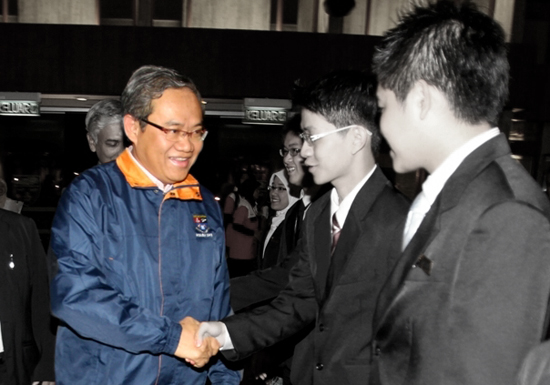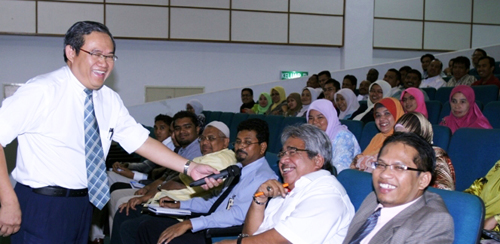YESTERDAY, Universiti Malaya (UM) vice-chancellor Prof Datuk Dr Ghauth Jasmon talked about what public higher education needs to do in the larger national agenda of making Malaysia a high-income nation.
In the final installment of a two-part interview with The Nut Graph, Ghauth talks about the Key Performance Indicators (KPIs) he has instituted since his appointment in November 2008. Since his taking over, UM has regained a spot in the top 200 of the world’s best universities at 180th place, compared with 230th place in 2008 and 246th place in 2007. UM was formerly among the world’s top 100 best universities before its decline in 2005, when it achieved 169th place.

Ghauth has implemented merit-based promotions and has adopted a demanding, results-oriented approach for the university. Can UM once again be a leader in Malaysian higher education?
TNG: What do you attribute UM’s comeback to the top 200 universities in the Times Higher Education – QS World University Rankings 2009 to?
Ghauth Jasmon: When I first came in, I saw that we were perceived as the best institution. But upon examining the fundamentals, we were in a very fragile position. What I mean by fundamentals is the quality of research, and the research outputs that you get. We were in danger of being overtaken by others.
And I quickly reorganised a few things. To do that I set targets to make the university competitive again, targets like being published in index journals. And I emphasised that all research money given out must come back at least in terms of publications and citations. This is put across the board for all faculties. Because of that, we saw the rise in terms of quality again.
Secondly, in order for the university to grow, we need more good people in the system. So I started attracting good academics from abroad. I flushed the system with these people while we grow young, bright locals. There was a multiplying effect. Firstly, the KPIs, and secondly, having proven researchers in the system. It caused others in the system to wake up to the reality of conditions now.
So our research productivity shot up again. You need people from outside because this will give fresh blood, inspiration and new ideas. UM has close to 400 foreign academics now, almost all with PhDs. We now insist on a strong research track record by checking their publication and citation records.

What other KPIs have you instituted since coming on board?
We evaluate people along five basic criteria. One is research publication, which must be in ISI (Institute for Scientific Information)/WoS (Web of Science)-indexed journals. Secondly, academics must have conducted research supervision for a certain number of PhD or Masters students before they can be considered for a certain position. Thirdly, they must get above-average scores in the teaching evaluation by students. And then they have to do consultancy or become resource persons. Finally, they have to do administrative work.
These are the criteria for promotion to become professor or associate professor. Those who prove themselves with research excellence and perform according to the KPIs are being promoted. Those who don’t get promoted know why. Everybody has to turn around.
Since we established these KPIs a year and a half ago, all the other universities have begun following us. And this is a healthy development because it means the other universities are also coming up in terms of standards. As time goes on, the standard of all Malaysian universities will go up.
At the end of the day, that’s what we want. So UM is like a trendsetter, and if we can continue this progress, it will help in creating an innovative society. UM has to keep increasing its standards, and this will be good for the nation.
Are there other aspects of mindset change that need to be addressed?
One of the things I’ve emphasised is that we must look at the top universities in terms of their work and research culture. There must be frequent discussions among researchers, they must give seminars, and they must network internationally with other researchers.
I’ve also emphasised that we want more of our undergraduate students to go abroad and spend a period of time there, and we also want to bring in foreign students to spend time on our campus. It will make students much more exposed internationally and improve the quality of our graduates.
Our target is to have 1,000 undergraduate students go out every year and 1,000 foreign undergraduates come in every year. As of July 2010, we have fulfilled 60% to 70% of this target. It is additional cost for the university, and we are using our endowment fund for it.

Does achieving a higher place in the rankings come at the cost of certain things? For example, to internationalise the university, giving up places for local students for more foreign students; or to get publish and cited, to sacrifice scholarship and research done in Bahasa Malaysia?
We have limited places for foreign undergraduates to 5% only, as per the requirement by the Higher Education Ministry. But there is no limit on foreign postgraduate students. We also have entrance requirements for postgraduates. So they now require much higher standards to get into UM.
If we depend on local students as a supply for our postgraduate courses, we won’t have enough. There are not enough Malaysians to fill postgraduate courses, especially when we want good students to come in. In the end, we have come to a certain balance. We now have about 9,000 postgraduate students, of which 40% are foreign students. We have 17,000 undergraduates, both local and international.
With regards to publishing more in English compared to Bahasa Malaysia, we have to in order to compete internationally. All the high-quality ISI/WoS-indexed journals are in English. Of course, if you are in a faculty like Akademi Pengajian Melayu, they still publish in Bahasa Malaysia, but they are still required to publish in ISI/WoS journals. ![]()
The Nut Graph is hosting its second Found in Conversation event on Creativity and Innovation in Education on Sunday, 25 July 2010 at Leonardo’s Dining Room & Wine Loft in Bangsar from 7pm onwards.
The event will be hosted by The Nut Graph editor, Jacqueline Ann Surin, and will feature 3R executive producer Marina Mahathir, Five Arts Centre founder and educator Marion D’Cruz, and home schooling proponent KV Soon.
For reservations, e-mail events@thenutgraph.com or call +603 7957 6009/8009.
[related-posts]


Dheep says
One of the best VC ever. I had the privilege of interviewing him for MMU Yearbook before while he was still MMU President. Very nice person and is a visionary.
Danny Leebob says
Malaysians tends to approach education by looking at grades. The objective is the grades, not the benefit of learning and knowledge. So most of the students concentrate on past years papers and repetitive exercises. With persistence you will get the result and the grades you want but the students are not learning.
I have a feeling that our universities are like that. The objective is the position. So if you try hard enough, like getting more foreign students, and concentrating on key factors that affect position, you will achieve the position you wanted. However does that means the quality of the universities have improved?
nstman says
I think we have heard it once too often. Producing calibre students? It must be a joke. Everyone knows our universities are producing straight-A students (I think we have the most number of first-class honours graduates in the world) who can’t even speak basic English. In other words, we are producing idiots who can be classified as functional literates, or semi-literate clowns. I don’t mean to run down our grads, but that is the truth. So I urge our Big Napoleans to stop talking drivel and face the facts.
Lim Chung Tat says
Ghauth Jasmon, the Vice-Chancellor of UM until 6th November 2013, stated that UM was sending out 1,000 students every year and bringing in another 1,000 students yearly from outside. He added that the cost was being met from the endowment funds of the university. Please! The endowment funds of UM are not meant for such purposes. In fact, almost all the endowment funds are given to UM for specific purposes. The Auditor-General must ensure that the terms and conditions of the endowment funds are complied with and that the funds are not used for any other purposes or as the Vice-Chancellor likes.